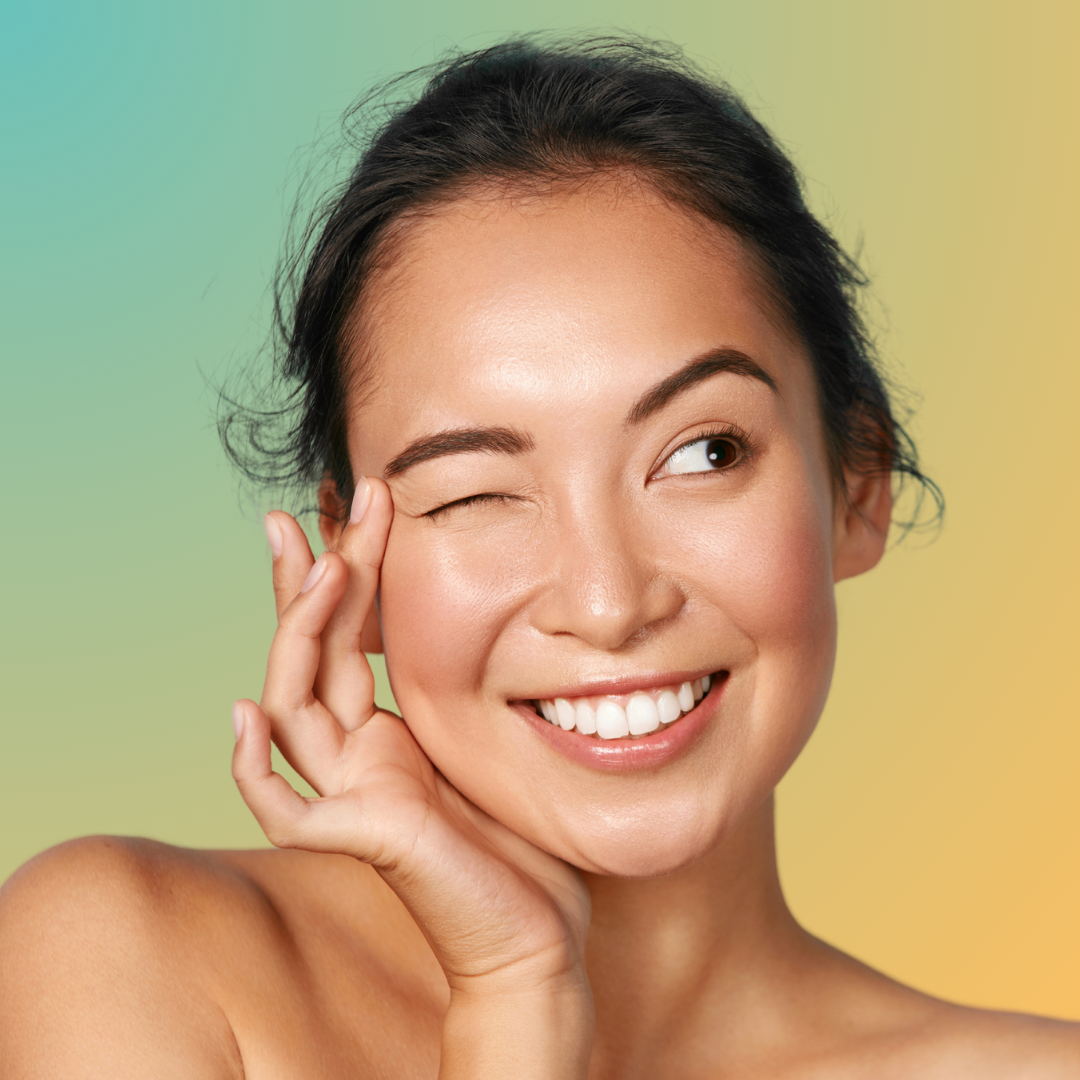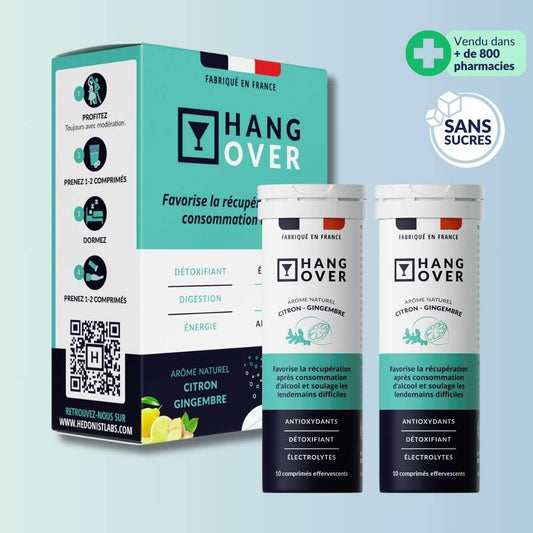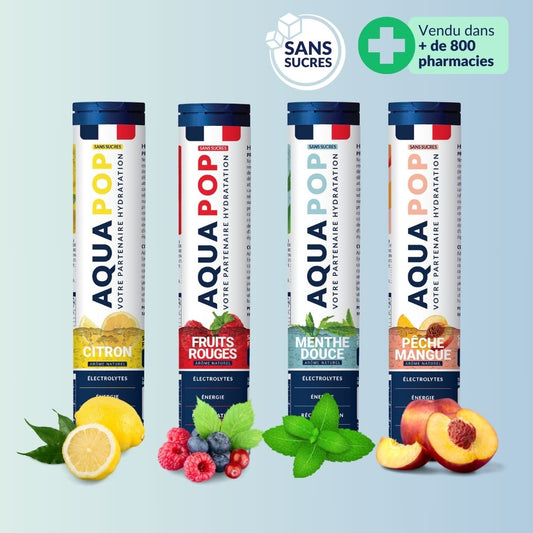Why are we thirsty the day after a party?
Our bodies are dehydrated.
In addition to mobilizing our body's water reserves, Allen C.D., have shown that alcohol disrupts the functioning of the brain's pituitary gland, leading to a reduction in the secretion ofantidiuretic hormone.
This hormone is involved in the body's reabsorption of water in the kidney.
Simply put, the body eliminates more water than it absorbs. Symptoms of dehydration include fatigue and, above all, headaches. Don't wait until you're thirsty to rehydrate, or it'll be too late.
Why do we get headaches?
There are many reasons for alcohol-induced headaches.
- Alcohol causes severe dehydration.
- The sugar in alcohol prompts the body to produce insulin,causing blood sugar levels to fall. Hypoglycemia induces headaches.
- The accumulation of acetaldehyde, a toxic metabolite of alcohol. Acetaldehyde is an intermediate product generated in the liver during the elimination of alcohol.. It is also responsible for hangover symptoms such as headaches.
Although alcohol is considered a sedative, its consumption disrupts our sleep.
Alcohol binds to numerous receptors in the central nervous system, including GABA receptorsA receptors (the most important inhibitory neurotransmitter in the human brain). As a result, excessive consumption has a depressant effect on the central nervous system, and this influences sleep in several ways:
Thakkar M.M. et al, (2015), have shown that alcohol acts on sleep in several ways:
- Sleep cycle disorders
- Reduced REM sleep and disruption of slow-wave sleep
- Night-time awakenings
- Exacerbation of certain sleep disorders (snoring or sleep apnea)
Sleep quality is therefore affected by alcohol consumption. *
Why are we tired?
Fatigue can be explained by a combination of 3 factors:
Why do we crave fatty foods?
There are 2 reasons for this behavior:
- Costardi J.V. et al (1992) have shown that alcohol activates the receptors of the endocannabinoid system, which provoke hedonic hunger. In other words, hunger unjustified by need, with an attraction to foods that give pleasure, often fatty and/or sweet.
(this phenomenon is also found after cannabis consumption) **.
When we drink alcohol, the inhibition threshold in our brains is lifted. In other words, we give free rein to our emotions and desires, regardless of consequences or context. In biological terms, the disinhibiting effect of alcohol can be explained by the inhibition of two neurotransmitters: noradrenalin and serotonin. As we have already discussed, by binding to GABA receptors, alcohol exerts an inhibitory effect. In this case, on noradrenalin and serotonin, and disrupts their secretion.
- Noradrenaline controls our reactions to danger.
- Serotonin helps control emotionality and mood.
Cains S. et al, (2017), have shown that alcohol has an effect on the hypothalamus, particularly on Agrp neurons. As these neurons are involved in regulating the sensation of hunger, alcohol's action on them will reduce our feeling of satiety.
Under normal circumstances, it helps to control our food urges and cravings for high-calorie foods. But after a few drinks, the satiety barrier is lifted ***.
Is there a type of alcohol to avoid?
A 2009 Brown University study showed that brown alcohols contained more impurities than clear ones.
Gin, vodka, sake, red wine, beer, whisky
These impurities are associated with more pronounced hangover symptoms.
It's also important to choose a quality product, because thehe quality of the alcohol plays an essential role. For example, spirits that are poorly distilled will contain other types of alcohol, such as methanol, which can be dangerous in high doses.
Why is alcohol eliminated differently from one person to another?
Regardless of the quantity consumed, the liver is only capable of metabolizing a certain amount of alcohol over time. This process is rapidly saturated, and the rate of metabolism depends in particular on the quantity of metabolizing enzymes (cytochromes) present in the liver. An inter-individual inter-individual factor will define this quantity, which varies from person to person and seems to be genetically determined.
Allen, C. D., (2011). Immediate and prolonged effects of alcohol exposure on the activity of the hypothalamic-pituitary-adrenal axis in adult and adolescent rats.
Brain, Behavior, and Immunity, 25S50-S60.
https://doi.org/10.1016/j.bbi.2011.01.016
Cains, S., (2017). Agrp neuron activity is required for alcohol-induced overeating. Nature Communications, 8(1). https://doi.org/10.1038/ncomms14014
Costardi, J. V. V., (2015). A review on alcohol: from the central action mechanism to chemical dependency. Revista da Associação Médica Brasileira., 61(4), 381-387. https://doi.org/10.1590/1806-9282.61.04.381
Thakkar, M. et al, (2015). Alcohol disrupts sleep homeostasis. Alcohol, 49(4), 299-310. https://doi.org/10.1016/j.alcohol.2014.07.019
* https://www.educalcool.qc.ca/wp-content/uploads/2019/09/Alcool-et-sommeil.pdf
** According to a study published in the journal Sleep
*** A second study, published in the journal Health Psychology,
https://www.doctissimo.fr/sante/atlas-corps-humain/question-corps-humain/manger-gras-apres-une-soiree




